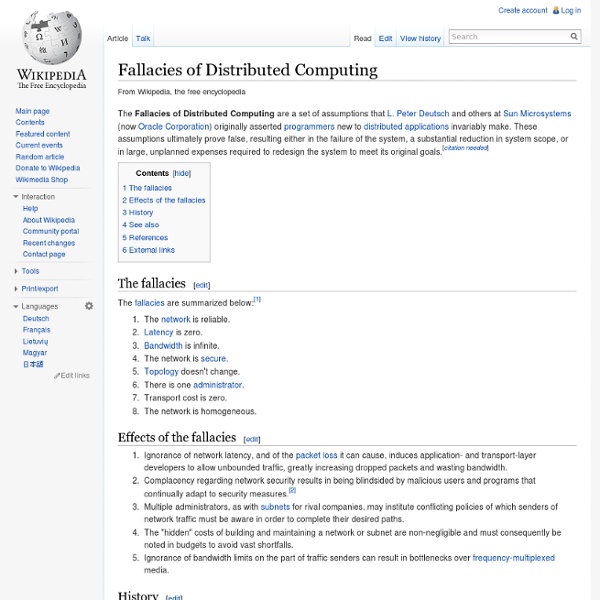Exposé Systèmes/Réseaux - Les grilles de calcul - Ingénieurs2000 - Informatique/Réseaux 3ème année - 2006/2007
Introduction Au cours de notre troisième année d'étude de la formation Informatique Réseaux de l'école d'ingénieurs Ingénieurs 2000, nous devions étudier un thême portant sur le système, le développement ou les réseaux. Cette exposé fût encadré par le Directeur de la filière M. Étienne Duris, ainsi que du Directeur de l'école, M. Objectif Notre choix s'est porté sur la présentation d'un système de calcul parallèle en cours de popularisation: Les grilles de calcul. Depuis quelques mois voire quelques années, le Grid Computing, ou grille informatique, fait de plus en plus parler de lui dans l'univers des nouvelles technologies.
World Community Grid - Accueil
Osiris - Serverless Portal System
Difference Between Grid Computing and Distributed Computing
Definition of Distributed Computing Distributed Computing is an environment in which a group of independent and geographically dispersed computer systems take part to solve a complex problem, each by solving a part of solution and then combining the result from all computers. These systems are loosely coupled systems coordinately working for a common goal. It can be defined as A computing system in which services are provided by a pool of computers collaborating over a network .A computing environment that may involve computers of differing architectures and data representation formats that share data and system resources. Definition of Grid Computing The Basic idea between Grid Computing is to utilize the ideal CPU cycles and storage of million of computer systems across a worldwide network function as a flexible, pervasive, and inexpensive accessible pool that could be harnessed by anyone who needs it, similar to the way power companies and their users share the electrical grid. 1. 2.
Distributed Computing
Byzantine fault tolerance
In fault-tolerant computer systems, and in particular distributed computing systems, Byzantine fault tolerance is the characteristic of a system that tolerates the class of failures known as the Byzantine Generals' Problem,[1] which is a generalized version of the Two Generals' Problem - for which there is an unsolvability proof. Byzantine failures are considered the most general and most difficult class of failures among the failure modes. So called fail-stop failure mode occupies the simplest end of the spectrum. Whereas fail-stop failure model simply means that the only way to fail is a node crash, detected by other nodes, Byzantine failures imply no restrictions, which means that failed node can generate arbitrary data, pretending to be a correct one, which makes fault tolerance utterly difficult. The phrases interactive consistency or source congruency have been used to refer to Byzantine fault tolerance, particularly among the members of some early implementation teams.[2]
Category:Distributed computing problems
Problems and challenges related to distributed computing, distributed systems and distributed algorithms, including: Computational problems that have been studied in a distributed setting.Challenges related to dividing a computational problem into multiple tasks that can be solved in parallel.Challenges related to fault-tolerance and synchronisation. The focus is on formal, mathematical problems. See also[edit] Category:Distributed algorithms for algorithms that solve these problems. Subcategories This category has the following 2 subcategories, out of 2 total. Pages in category "Distributed computing problems" The following 31 pages are in this category, out of 31 total.
upright - Making distributed systems Up (available) and Right (correct)
UpRight is an infrastructure and library for building fault tolerant distributed systems. The goal is to provide a simple library that can ensure that systems remain up (available) and right (correct) despite faults. UpRight tries to make fault tolerance easy. Typically, connecting an application to the UpRight library requires only a few small changes, after which UpRight can handle the details of replication, fail-over, consistency, etc. The UpRight replication engine provides the following features: High Availability: the system remains available even if as many as u nodes fail (u is a configuration parameter) High Reliability: The system remains correct even if as many as r nodes fail, even if these failures are Byzantine (e.g., a hardware error or software bug corrupts a node's state or the messages a node sends to/receives from clients) High Performance: the performance of the UpRight version of the system is close to the unreplicated version.




The network bites. Never forget it. by alexis Oct 6